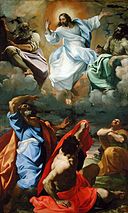 |
| Ludovico Carracci [Public domain], via Wikimedia Commons |
What does Messiah mean?
Addition to Sermon on Transfiguration
(Y-not question the Sunday Readings)
by Beehive , Brigadoon West Australia, Tuesday, March 18, 2014, 20:26
Ynot:-
www.catholica.com.au
No, the scriptures are the apostles' way of telling what they saw and heard, and their way of saying how their conviction developed and grew and became clear and definite. How they progressed from Yes and No, to certainty. And they do not apologise for saying that conviction came from the Most High.
"This is my beloved son listen to him."
This phrase is the critical element of the transfiguration episode.
It also surfaces In one of the Gospels at the baptism of Yeshua at the Jordan. A voice from heaven saying the same thing.
Even though Peter gets a bad press for his three tents, this vision or whatever it was, had revealed something unexpected about Yeshua . They expressed it as seeing his "glory".
What does glory mean? If Yeshua had just kicked the winning goal in the grand final that clinched the premiership, we would understand. There was something great about him not realised until this moment.
The hidden talent of champions is inside them. A champion is the sum of his parts.
We don't actually know the fullness of this talent until we have watched him reach his peak and is on his way out. We can only judge, compare and rank a champion among others in the hindsight of history.
This mountain top encounter had a profound effect on Peter. Towards the end of his life he wrote about it in glowing terms in one of his epistles.
These words of YHWH whom Yeshua called "father" clinched Peter's hunch that Yeshua was the Messiah.
These words for Peter were the final missing piece of the prophetic jigsaw that connected Yeshua and Yahweh in the promised father and son relationship. This was the missing messiah ingredient.
Yahweh's prophecy to David that he would raise up a descendant to whom he would give an everlasting kingdom contained the ingredient "I will be his father, and he will be my son".
In itself, this could not have possibly been interpreted, or understood in those days to mean that the messiah would be Yahewh!
Nor does it have any connection with Atonement theology , or Trinity,..... It is a simile. But a very unique and essential one, when considered again in hindsight of what Yeshua was called to endure.
In later life Peter recognised this as the final bit of understanding that convinced him that Yeshua was the Anointed. This encounter allowed Sophia to get through to Peter with the gift of "knowledge", and from then on he saw Yeshua's "glory", that is his full identity as the Anointed one.
We must never get ahead of ourselves with a revelation like this. "Messiah" has to be understood within the context of the times, and within the confines of the information about it before 27AD.
We do have the advantage of hindsight in examining this concept.
But we also have to keep the rules:- Investigate all and only its elements that were available to that Jewish community before that moment in history. It then has to be evaluated only within those confines. An entity is only the sum of its parts.
"Messiah" is the sum of all its predictions given to Israel before 6BC. Nothing else can be added, or taken away from it. Any messianic teaching that exceeds those parts is patently erroneous.
To find out the ingredients, graces and limitations of the promised messiah, one has to return and surf the Old Testament. It is surprising what it actually brings up! It is a living, amazing series of revelations.
Beehive
Brian Pitts
